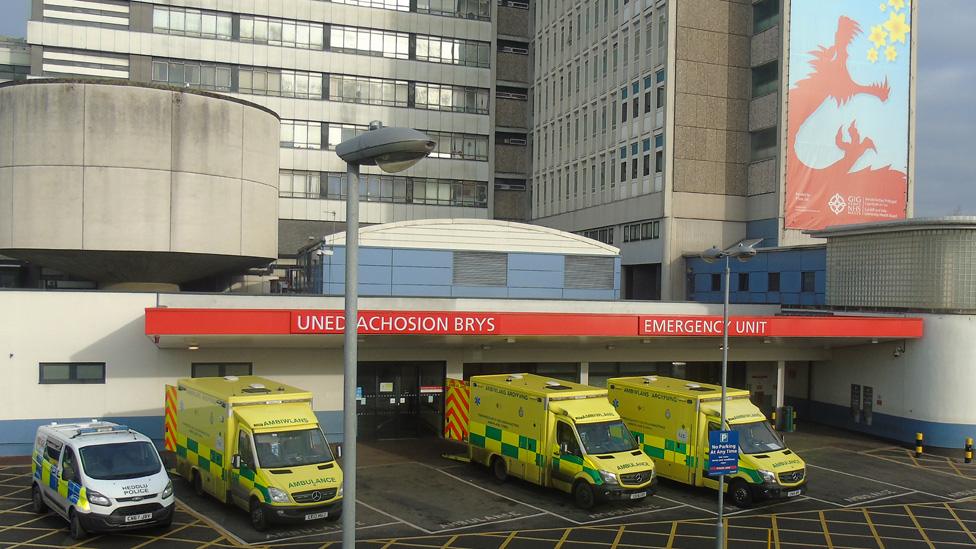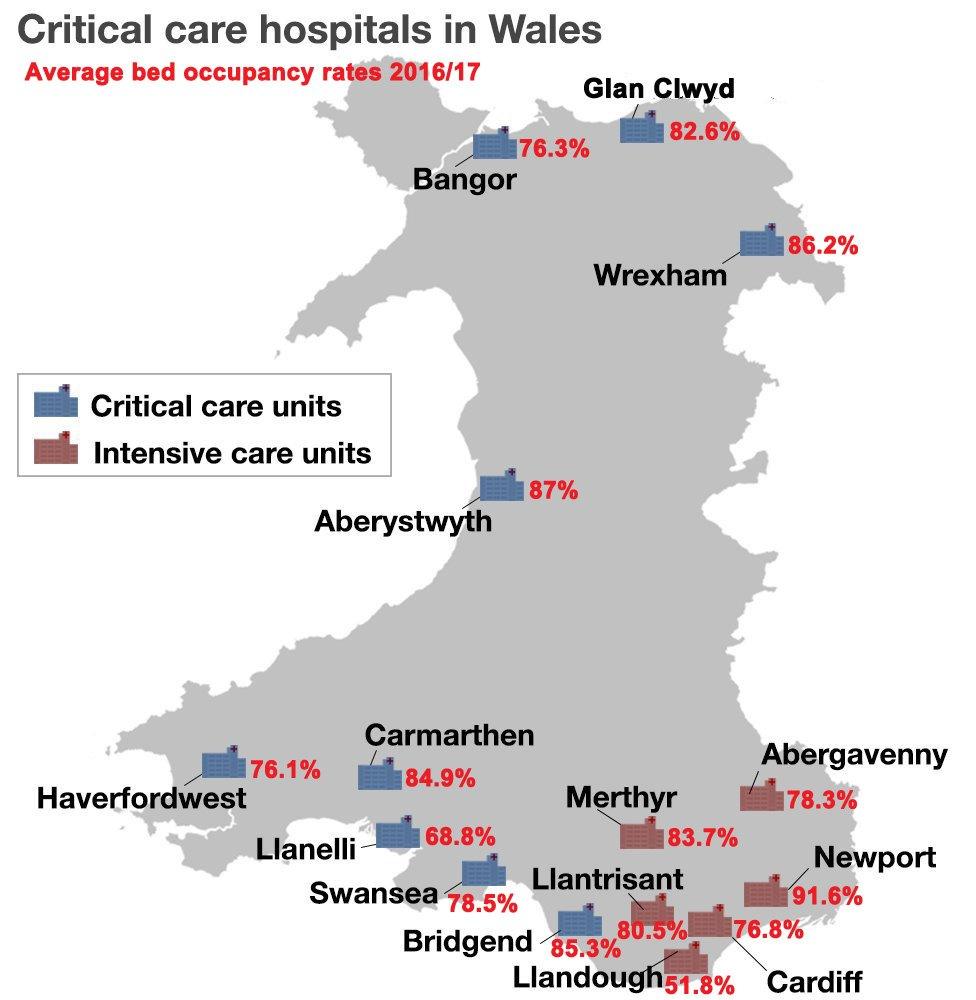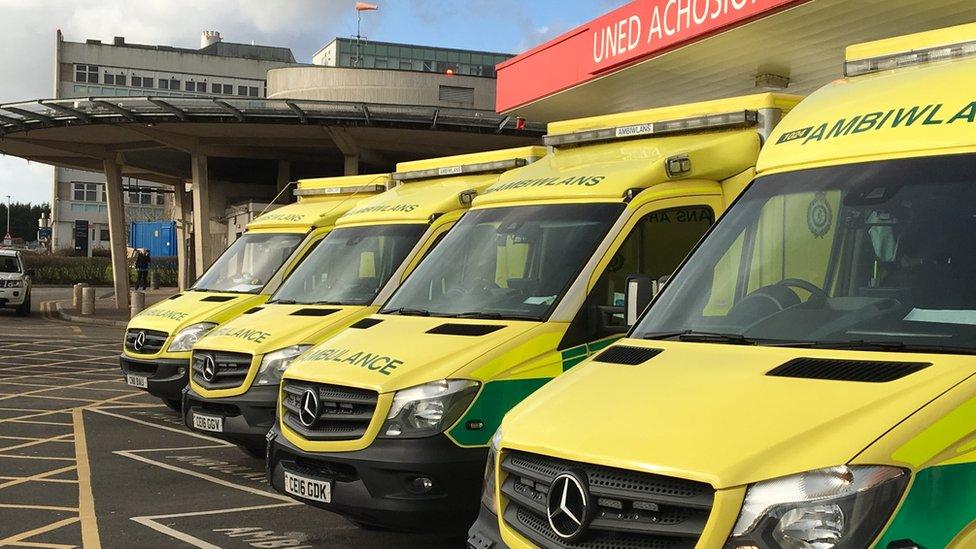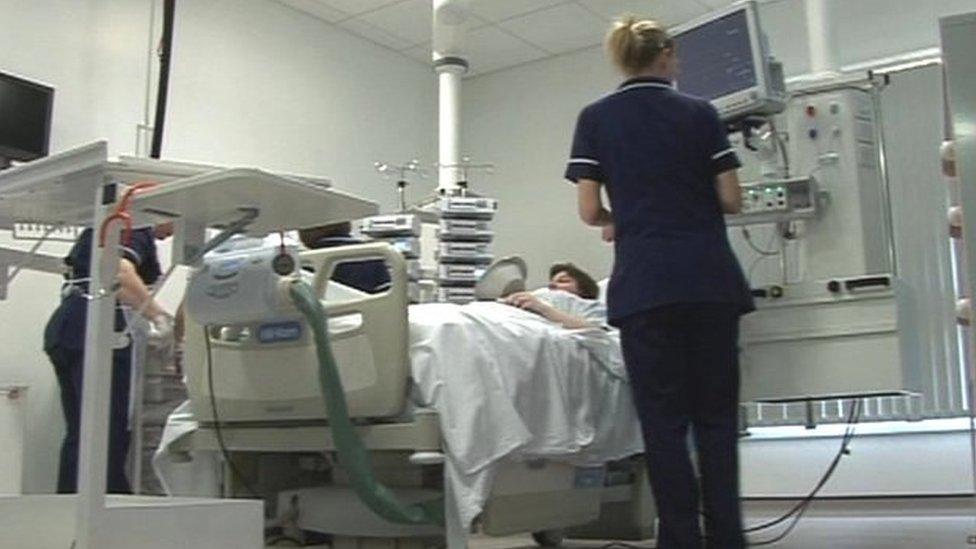Cardiff and Vale critical case pressure leads to plea
- Published

University Hospital of Wales said it has faced 'sustained and increased activity'
Wales' biggest hospital has faced serious difficulties in caring for some critically ill patients.
An email refers to "unprecedented levels of pressure" in Cardiff and Vale health board, including at the University Hospital of Wales.
The situation became so serious that an appeal was made to neighbouring health boards to come to its aid.
Cardiff and Vale said it had recently experienced "exceptional demand" and that staff were working "tirelessly".
The recent email from within the local critical care network, seen by BBC Wales, says the health board was dealing with 48 critically ill patients.
Some were being kept in operating theatre recovery areas or being treated in the cardiac intensive care unit.
This was due to a lack of space in the main intensive care units.
The email goes on to ask neighbouring health boards to use "surge" capacity to make space in their hospitals to accommodate some of the Cardiff patients "to ensure all critically ill patients can be cared for appropriately".
Frontline NHS services across Wales have been under considerable pressure following the recent cold weather, dealing with a spike in seriously ill patients.
But there have been long-standing concerns about a shortage of critical care beds within NHS Wales.
Dr Graham Shortland, the health board's medical director, pointed to "exceptional demand" throughout February and into March.
This included a 13% increase in patients requiring resuscitation and a 15% rise in seriously ill patients over the age of 85.
"At times of sustained and increased activity we will look across the critical care network for support in keeping with the standard escalation process," he said.
"It is important to note we are a tertiary centre and we regularly work with neighbouring health boards to routinely repatriate patients back to their local hospital when their episode of tertiary care has been completed.
"This is in the best interest of the patients and families concerned. When this is not possible we will also follow our own internal escalation processes."
Dr Shortland added: "Over this period of high and sustained activity we have regularly been in contact with the critical care network to ensure we use any additional capacity that can be created for our patients."
A report last week, by the Faculty of Intensive Care Medicine, warned critical care units across the UK were experiencing a "capacity crisis" - with critical care doctors in Wales reporting their units being most full - up to and beyond capacity.
The report was based on a survey of critical care doctors. Those working in Wales estimated, in January, a bed fill rate in critical care units of almost 100%
Although the report suggested capacity in some Welsh units had exceeded 100% - with beds being co-opted beyond critical care for temporary usage.
The survey found:
Bed capacity in Wales was estimated to be at least 95%; the average for Scotland was 84%. The NHS estimate for England was just below 87%. The highest level recommended for safe and efficient patient care is 85%.
91% of consultants in Wales said they were seeing more patients needing to be transferred to another hospital more often because of lack of available ICU beds. The UK average is 82% and Scotland 70%.
It is 18 years since a review of critical care but the FICM said the service had "dramatically changed" and demand had escalated.
"No intensive care doctor is willing to compromise on patient safety, but without specific interventions targeted towards alleviating system pressures, the strain on intensive care staff and resources will increase exponentially," said Dr Carl Waldmann, dean of the Faculty of Intensive Care Medicine.
"Staff are doing an incredible job to keep patients safe with the resources available to them - it is the system that requires urgent critical care."

What are the intensive care issues in Wales?

Official statistics show an average bed occupancy rate of 80% for intensive care units in Wales in 2016/17 - this is up on five years ago but does not show surges in demand over short periods.
The NHS in Wales has a lower number of critical care beds for the size of the population than the rest of the UK; and significantly lower than many other European countries.
Wales has 5.9 critical beds per 100,000 population compared to the European average of 11.5.
Due to a growing and ageing population, demand for critical care in Wales is increasing at around 4-5% per year and the most recent report on the service in Wales last summer , externalsaid delayed transfers of care of patients who were fit enough to go onto other wards were "consistently high".
Critical care units across Wales were "under enormous pressure from high demand and limited capacity".
However, the report also notes improvements in other areas - with survival rates increasing, readmission rates to critical care falling and a significant decrease in the number of patients discharged prematurely from the units.
- Published22 February 2018

- Published18 January 2018

- Published26 August 2016
